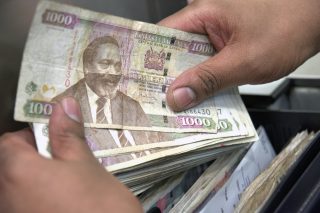Kenya is employing demonetisation in its fight against corruption after the Central Bank (CBK) introduced a series of new banknotes into the market. The currency switch takes effect from June 1, 2019.
According to the CBK Governor, Patrick Njoroge, the country’s currency (especially the Ksh1,000 note) is used for illicit financial flows and forgery in Kenya and other neighbouring states. “These are grave concerns that would jeopardize proper transactions and the conduct of commerce in our currency,” he said.
In what is meant to stamp out counterfeit and illegal cash flows, the government disclosed that the 1,000 shillings note, which is the largest currency bill, will be discontinued by October 1, while there is no deadline attached to the other denominations. Kenyans now have to turn in their old notes for exchange.
To exchange money below one million shillings, there is no need for a bank account but the individual must have official identification. Those exchanging an amount between one million to five million shillings must do it at their own banks where they own an account. Without accounts, they have to contact the central bank to give them approval and must prove the money belongs to them in line with anti-money laundering laws. While Kenyans exchanging over five million must contact the apex bank.
The latest development in Kenya’s fight against corruption follows the likes of India, Nigeria and Ghana who have withdrawn old notes before for the same purpose. However, Njoroge noted that Kenya wanted to avoid the Indian crisis where a quick withdrawal of demonetised currency led to panic. To achieve this, the apex bank has been negotiating with banks, foreign exchange (forex) bureaus and payment providers in the country and across the region to ensure the move was a success.
Regional neighbours react
Some of the illicit money is said to have already crossed the border into neighbouring countries, where holders exchange it in banks and forex bureaus in the interdependent economic bloc. “Illicit financial flows involving the Kenya shilling is not just in Kenya. They also affect our neighbouring countries,” CBK governor averred.
Following the introduction of new banknotes by the CBK, the Tanzanian Government banned the exchange of its currency with that of Kenya as it moves to lock out illicit inflows into the country.
“The Central Bank of Kenya has suspended currency conversion and repatriation of all Kenyan currency to restrict illicit flows into the Republic of Kenya. Further, the Bank of Tanzania has been advised to freeze CBK currency collection account with immediate effect,” the Bank of Tanzania (BoT) said in a notice to commercial banks.
Acting on the directive of BoT, the Chairman of Tanzania’s Bankers Association, Abdulmajid Nsekela, confirmed they would not be converting the Kenyan shilling. The Bank of Uganda (BUG) also made a similar announcement on Monday but a banker told The Citizen that they were converting other denominations except for the 1,000 notes.
The implication of the suspensions by Tanzania and Uganda for the exchange exercise of Kenya shillings is that those with cash will have to take it across the border to swap for the new notes.
The Kenyan government has so far received support from various outfits, most of whom believe the demonetization process will be good for fiscal health, bring more liquidity into the economy, and curtail the underground economy largely hidden from the financial system, Quartz reports. However, some analysts say the move grants a “quiet amnesty” to illicit dealers who might use the banks and other proxies to beat the system.








